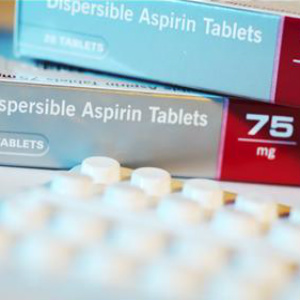Patients with atrial fibrillation ‘at risk’ from outdated aspirin prescribing practice

Aspirin is still being widely prescribed to patients with atrial fibrillation when it offers no benefit and may even be harmful, a leading UK expert on stroke prevention has warned.
Professor Gregory Lip, professor of cardiovascular medicine at the University of Birmingham, said his Europe-wide study showed cardiologists are too often continuing to prescribe aspirin in patients with atrial fibrillation, despite the fact it is no longer recommended in clinical guidelines and could lead to patients suffering serious bleeding events.
For the study, published in the American Journal of Medicine, Professor Lip’s team analysed thrombotic prescribing among 3,119 patients, across nine countries, who had recently been diagnosed with atrial fibrillation.
Of 902 patients admitted to hospital, who did not undergo cardioversion or catheter ablation, 41% were prescribed aspirin either alone or in combination with an anticoagulant.
Aspirin use was particularly common among patients with CHD, whereas the authors stressed that anticoagulation is the best option in patients with stable CHD.
Related articles
NICE urges GPs to adopt latest risk scores for assessing stroke risk in atrial fibrillation
Professor Lip commented: ‘The perception that aspirin is a safe and effective drug for preventing strokes in atrial fibrillation needs to be dispelled.
‘If anything, you could say that giving aspirin to patients with atrial fibrillation is harmful, because it is minimally or not effective, yet the risk of major bleeding or intracranial haemorrhage is not significantly different to well-managed oral anticoagulation.’
He added that contemporary guidelines say that aspirin should not be used for the prevention of stroke in patients with atrial fibrillation.
NICE draft guidance on the management of atrial fibrillation recently brought its advice into line with European Society of Cardiology guidance that aspirin should no longer be prescribed for patients considered at risk of stroke, which should now be determined by their CHA2DS2-VASc score.
However the QOF still uses the CHADS2 score and rewards GPs for putting patients on either aspirin or an anticoagulant, for those with a score of 1.
Are you up to date on CVD and diabetes?
The first of a new series of 2014 Pulse clinical seminars takes place on 20 March in Birmingham and will give you practical take-home tips on diagnosis and management of heart disease and diabetes. Click here for more information and to register. This one-day event is worth a suggested 6 CPD hours.
Pulse July survey
Take our July 2025 survey to potentially win £1.000 worth of tokens

Visit Pulse Reference for details on 140 symptoms, including easily searchable symptoms and categories, offering you a free platform to check symptoms and receive potential diagnoses during consultations.











